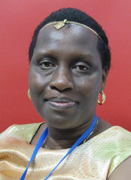Ebola Outbreak: WHO meeting, resources and more
 In Liberia - Atai Omorutu
In Liberia - Atai Omorutu
As mentioned in Amanda Howe's most recent Policy Bite, well known WONCA personality Atai Omorutu, of Uganda, is working with people with Ebola. She writes from Liberia "It is not easy out here. Situation is quite volatile. Much international support is needed although internal systems also need serious strengthening. Misconceptions in the community abound and are fueling the epidemic. The Ebola virus in this epidemic is particularly aggressive and quite virulent. Mortality is close to 70% and may be higher because people are dying in the community faster than we can count! "
We hope to provide more updates about Atai's work from time to time.
WHO Public Health Emergency of International concern
The first meeting of the Emergency Committee convened by the Director-General regarding the 2014 Ebola Virus Disease (EVD, or “Ebola”) outbreak in West Africa was held by teleconference on Wednesday, 6 August 2014.
Read report.
After discussion and deliberation on the information provided, the Committee advised that:
• the Ebola outbreak in West Africa constitutes an ‘extraordinary event’ and a public health risk to other States;
• the possible consequences of further international spread are particularly serious in view of the virulence of the virus, the intensive community and health facility transmission patterns, and the weak health systems in the currently affected and most at-risk countries.
• a coordinated international response is deemed essential to stop and reverse the international spread of Ebola.
The World Health Organization (WHO) has reported this is the largest
outbreak ever recorded with the potential for international spread.
Refer FAQ sheet It was the unanimous view of the Committee that the conditions for a
Public Health Emergency of International Concern (PHEIC) have been met.
As of Saturday 11 August 2014 the WHO confirmed 1,975 clinically-compatible cases of Ebola virus disease across Guinea, Liberia and Sierra Leone in West Africa, of which 1,069 have died.
Risk of infection
In the current outbreak in West Africa, the majority of cases in humans have occurred as a result of human-to-human transmission.
Infection occurs from direct contact through broken skin or mucous membranes with the blood, or other bodily fluids or secretions (stool, urine, saliva, semen) of infected people. Infection can also occur if broken skin or mucous membranes of a healthy person come into contact with environments that have become contaminated with an Ebola patient’s infectious fluids such as soiled clothing, bed linen, or used needles. Exposure risk includes unprotected sexual contact with an infected person up to seven weeks after they have recovered.
Key information from WHO
• Advice for travellers
- Information for travellers on risk, precautions and symptoms
• Frequently asked questions on Ebola virus disease -
Updated 8 August 2014
• Fact sheet on Ebola virus disease - Essential information on disease, transmission, prevention
Find out more about Ebola in Harrison’s textbook
Due to the WHO declaring the Ebola outbreak a global health emergency, Harrison’s have made the
chapter on Ebola and Marsburg Viruses in
Harrison's Principles of Internal Medicine, 18th ed openly available with no subscription required.